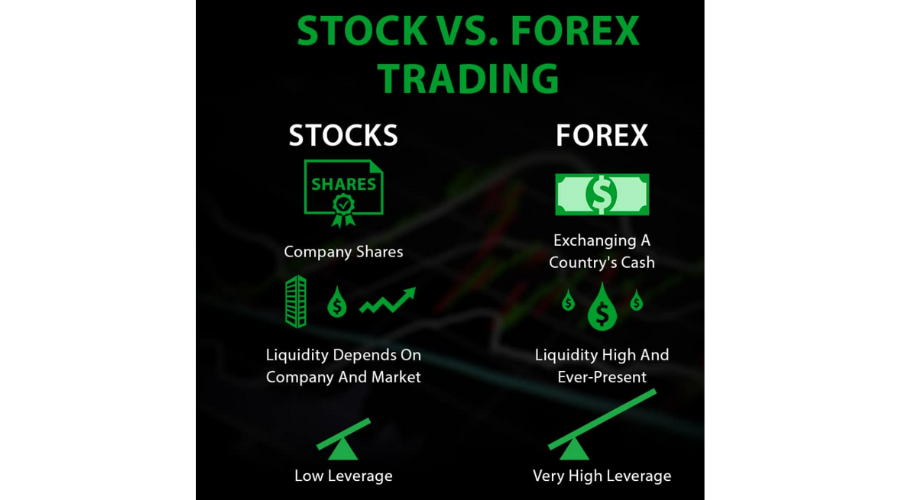Comprehensive Beginner's Guide to Forex and Stock Trading
2023-11-24 15:38:24
Trading is a strategic pursuit geared towards optimizing your financial growth over time. Whether you're targeting swift short-term gains or establishing a reliable income stream, delving into intelligent trading presents a promising opportunity to explore.
This guide is crafted especially for beginners, focusing on two dynamic and potentially rewarding markets: Forex and Stock Trading. At ACY Securities, we understand that stepping into the world of financial markets can be daunting. That's why we've designed our platform to be especially friendly for beginners, ensuring you have a smooth and supportive journey into the realms of Forex and Stock trading.
With a clear emphasis on education and user-friendly tools, ACY Securities stands as your ally, demystifying the complexities of these markets. Our aim is to empower you with knowledge and confidence, enabling you to make informed decisions and grow your assets effectively.
As we delve into the nuances of Forex and Stock trading, remember that ACY Securities is more than just a broker. We are your partners in navigating the financial markets, providing guidance, resources, and state-of-the-art tools to help you realise your potential returns. Let's embark on this journey together, as you step into the world of financial empowerment with ACY Securities.
A Primer on Forex and Stock Trading
Trading in the foreign exchange (forex) market involves the art of buying and selling currencies in pairs. On the other hand, stock trading navigates through the purchase and sale of shares in various companies.
The Significance of Distinguishing Forex from Stocks
As you embark on your trading journey, a critical step is understanding the nuances between forex and stock trading. While there are parallels, these markets possess unique characteristics in terms of volume, liquidity, and market dynamics. Grasping these differences is crucial in aligning your trading style with the right market.
In the subsequent sections, we'll delve deeper into each market, exploring their unique traits and offering guidance on how to approach them as a beginner trader. With ACY Securities by your side, you're not just venturing; you're embarking on a journey to financial empowerment.
Understanding Forex Trading
What is Forex Trading?
Forex trading involves the active exchange of foreign currencies, often pursued with the goal of garnering returns. This trading is predominantly speculative, where participants anticipate currency price movements to buy low and sell high.
How Does Forex Trading Work?
The foreign exchange market, overseen and regulated by a global network of financial institutions and banks, operates as the backbone of Forex trading. In this market, traders engage in the buying and selling of currency pairs, which represent the exchange rates between two different currencies. Each currency in a pair is identified by a three-letter code.
Typically, the first two letters indicate the country or region of the currency's origin, followed by a third letter representing the currency's name. For instance, the U.S. dollar and the British pound are denoted as USD and GBP, respectively.

In a currency pair quotation, the first listed currency is termed the 'base currency', while the second is the 'quote currency'. The quote essentially shows how much of the quote currency is needed to purchase one unit of the base currency, expressed as a ratio or fraction.
Forex traders, much like stock traders who buy and sell shares of companies, exchange large amounts of money between different currencies. Their goal is to speculate on the fluctuations in exchange rates, aiming to buy currencies at a lower price and sell them at a higher price to yield returns.
Advantages and Risks of Forex Trading
Advantages:
- The forex market is highly liquid, making it easy to enter and exit positions.
- Forex markets operate around the clock, providing flexibility for traders.
Risks:
- The forex market is less regulated than stock markets, leading to potential fraud and scams.
- Forex markets can be extremely volatile, leading to rapid price fluctuations.
How Does Stock Trading Work?
Stock trading is a strategy aimed at generating long-term returns, which can come from both dividend income and capital gains.
Acquiring Shares: When you purchase shares in a company, you become a partial owner of that public entity. This ownership grants you certain privileges, such as a voice in company decisions, eligibility to receive dividends, and the opportunity to benefit financially from the company's growth and breakthrough.
Trading on Exchanges: Stocks are bought and sold on stock exchanges. The price of a stock is influenced by various factors, including the company's financial performance, market supply and demand, and overall economic conditions.
Price Fluctuations: Generally, a company's stock price tends to increase if it demonstrates strong performance and consistent earnings growth. Shareholders who sell their shares at a higher price than the purchase price realise capital gains. Conversely, a company's stock price may decline if its earnings are poor or if the broader economy is facing challenges.
Advantages and Risks of Stock Trading
Advantages
- Long-term Gains: Stocks have the potential to yield significant gains over an extended period.
- Ownership Stake: Being a stockholder means holding a piece of the company.
- Dividend Income: Some stocks offer regular dividend payments, providing a steady income stream for traders.
Risks
- Market Volatility: Stock values can be adversely affected by economic downturns and market crashes.
- Company-Specific Risks: The financial health or operational issues of individual companies can negatively impact their stock prices.
Comparing Forex and Stocks
Now that we have a basic understanding of forex trading, let's compare the dynamics of the forex and stock markets to help you decide which suits your trading style.
Market Hours and Trading Times
- Forex Market: Unlike the stock market, Forex is not traded on a centralised exchange. Instead, it operates through the interbank market, allowing for direct transactions between private parties. This setup enables Forex trading to occur 24 hours a day, five days a week, irrespective of local business hours or trading sessions.
- Stock Market: In contrast, each stock exchange has specific trading hours, confining stock trading activities to these designated times.

Liquidity and Volatility
- Forex Liquidity: The Forex market, known for its high volume of trade, often displays high liquidity. This results in lower transaction costs and tighter spreads, especially when trading major currency pairings.
- Stock Liquidity: While many blue-chip stocks also offer significant liquidity, smaller, less-traded stocks may lack this feature.
- Forex Volatility: The value of currencies in the Forex market is influenced by a myriad of factors, including political, social, and economic events, making it typically more volatile than the stock market.
- Stock Volatility: Conversely, stocks generally exhibit less volatility and tend to follow more projectable market cycles.
Leverage and Margins
- Forex Leverage: Forex trading offers high leverage, especially when trading Contracts for Difference (CFDs). It's common to see leverage of up to 200:1, meaning traders can control £200 worth of currency with just £1 of initial capital.
- Stock Leverage: On the other hand, leverage in stock CFDs is usually much lower, ranging between 2:1 and 3:1. This implies that to manage a significant position in the stock market, traders need a considerably larger capital base.
- Risk Implication: Consequently, the potential for losing the entire capital is much higher in the Forex market due to its high leverage.
Starting with Forex
After comparing the key differences between forex and stock trading, we're ready to delve into how you can start your journey in forex trading.
Setting Up a Forex Account
- Choosing the Right Broker Account: Different types of broker accounts cater to various trader needs. Consider these factors before selecting an account:
- Principal Amount: The type of account depends on how much you're willing to allocate.

- Risk Tolerance: For lower risk, a micro account might be suitable. A standard account suits those willing to take bigger risks.
- Commitment Level: The amount of time you can dedicate to trading may influence your choice. More professional tools are often available for serious traders.
Basic Forex Strategies for Beginners
- Currency Pairs Selection: Focus on major pairs like EUR/USD, GBP/USD, or USD/JPY, known for liquidity and smaller spreads.
- Trend Following: Identify the prevailing trend using technical analysis. Buy in an uptrend and sell in a downtrend.
- Technical Analysis: Utilise tools such as RSI, Bollinger Bands, and Moving Averages to analyse price charts, identify patterns for entry, and exit points.
- Active Market Hours Trading: Engage in trading during peak hours when major markets like London and New York overlap, offering more liquidity and opportunities.
Essential Tools and Resources for Forex Traders
Utilising quality trading software and tools is crucial for advancement. Here are the top 7 forex tools recommended for beginners:
- Trading Platform: The core of your trading activities.
- Charting Tools: Essential for technical analysis and pattern recognition.
- Pip Calculator: Helps in assessing risk and potential profits.
- Economic Calendar: Keeps you updated with important market events.
- Forex Volatility Calculator: Assesses the market's volatility.
- Copy Trading Services: Allows you to mimic strategies of seasoned traders.
- Currency Correlation: Understands the relationship between different currency pairs.
Starting with Stocks
After comparing the key differences between forex and stock trading, we're ready to delve into how you can start your journey in stocks trading.
Setting Up a Stock Trading Account
- Choosing a Brokerage: Select a reputable online brokerage that aligns with your trading needs.
- Application Process: Complete the brokerage's application form, providing necessary personal and financial details.
- KYC Compliance: Verify your identity with a government-issued ID as part of the Know Your Customer (KYC) process.
- Funding Your Account: Deposit funds using the broker's available payment methods.
- Accessing the Trading Platform: Download or access the broker's trading platform to research and analyse stocks.
- Trading Stocks: Use the platform to buy and sell stocks by placing orders.
Basic Stock Trading Strategies for Beginners
- Buy and Hold: A long-term strategy focusing on holding stocks for years or decades, betting on the stock market's growth potential.
- Value-oriented approach: Identifying undervalued stocks through fundamental analysis, considering a company's financial health and earnings potential.
- Dividend-centric approach: Targeting stocks of companies that consistently pay dividends, offering a steady income stream.
- Dollar-Cost Averaging: Regularly allocating a fixed sum regardless of stock price fluctuations, mitigating market volatility and capitalising on low prices.
Essential Tools and Resources for Stock Traders
For beginners, having the right tools and resources is key to productive stock trading. Consider these essential elements:
- User-Friendly Trading Platform: The cornerstone of your trading activities.
- Charting Tools: Crucial for analysing stock trends and patterns.
- Risk Management Tools: To help manage and mitigate trading risks.
- Quality News Feed: Stay informed with real-time market news and updates.
- Economic Calendar: Keeps you updated on important economic events.
- Back-Testing Tools: Test your strategies against historical data.
Common Mistakes to Avoid in Trading
Having explored the key elements of Forex and Stock Trading, let's now shift our focus to an equally important aspect: understanding and avoiding common trading mistakes.
General Trading Mistakes
- Overtrading: Leads to poor judgment, increased transaction costs, and heightened risk.
- Lack of a Trading Plan: Trading without a plan often results in impulsive and disorganised decisions.
- Risking Too Much: Overexposing your portfolio to a single trade can lead to significant losses.
- Failing to Diversify: Not diversifying portfolio increases the risk of substantial losses.
Forex Trading Mistakes
- Inflexibility to Market Conditions: Failure to adapt to the dynamic forex market can result in losses or missed opportunities.
- Neglecting Stop-Loss Orders: Without stop-loss orders, traders risk substantial losses if the market moves against them.
- Ignoring a Trading Journal: Maintaining a journal helps in identifying trends, tracking performance, and learning from past mistakes.
Stock Trading Mistakes
- FOMO (Fear of Missing Out): Buying stocks due to fear of missing potential gains rather than sound analysis.
- Impatience: Expecting immediate gains and not giving ventured capital time to mature.
- Emotional Trading: Allowing fear and greed to drive trading decisions.
- Lack of Research: Trading stocks without proper analysis or due diligence can lead to uninformed decisions.
Making the Choice: Forex or Stocks with ACY Securities
Armed with insights into the fundamentals and pitfalls of trading, it's time to address a critical decision for any trader with ACY Securities: choosing between the Forex and Stock markets based on your individual goals and preferences.
Forex or Stocks? The Decision Depends on Your Goals
Choosing between forex and stocks depends on your personal trading objectives, preferences, and risk tolerance. Define your strategy clearly—whether it's for day trading, swing trading, or long-term venture. With ACY Securities' extensive resources, you can navigate either market effectively.
Forex: High Liquidity and High Risk at ACY Securities
The forex market offers significant opportunities with high leverage options. This can multiply your capital, but also brings high risk. It's essential to approach forex trading with a well-thought-out strategy, considering the market's volatility.
Stock Market: Stability with Risks
Trading stocks through ACY Securities offers a stable environment just like forex, but it's not without risks. The platform provides comprehensive tools and insights for trading in company-specific stocks and broader market indices, catering to those focusing on long-term growth.
Conclusion
Forex and stock markets, each with their unique characteristics and opportunities, present different paths to financial growth. This guide has explored the essentials of both markets, from the basics of forex trading and its high liquidity and volatility, to the more stable yet dynamic nature of stock trading.
For those starting with Forex or Stocks, ACY Securities caters to your needs with customised tools and resources. Whether it's selecting the right platform, understanding market dynamics, or exploring basic trading strategies, ACY Securities supports your aspirations with expert guidance and state-of-the-art tools.
Remember, the journey to becoming a proficient trader is not just about learning the mechanics of trading but also about understanding and managing the risks involved. Common mistakes, whether in general trading, Forex, or Stock Trading, can be avoided with disciplined strategies and a clear understanding of market dynamics.
With ACY Securities:
- Education Tailored to You: Catering to traders of all levels, we offer a diverse range of educational resources.
- Stay Informed: With us, you’re not just trading, you're making informed decisions backed by expert insights.
- Ready to Dive In? Take the leap and access a myriad of tools and insights to bolster your trading prowess. Open Your Account Now.
Explore ACY Securities' expert-led webinars to help traders navigate the world of CFDs and the forex market. Learn more about Indices, Gold, Oil and other tradable instruments we have on offer at ACY Securities.
You can also explore our MetaTrader 4 and MetaTrader 5 trading platforms including access to our free MetaTrader scripts. Then try out your own trading strategies on your own free demo trading account.
Try These Next
4 Powerful Tactics to Overcome the Most Costly Forex Mistakes
How to Master MT4 & MT5 - Tips and Tricks for Traders
The Importance of Fundamental Analysis in Forex Trading
Forex Leverage Explained: Mastering Forex Leverage in Trading & Controlling Margin
The Importance of Liquidity in Forex: A Beginner's Guide
Close All Metatrader Script: Maximise Your Trading Efficiency and Reduce Stress
Best Currency Pairs To Trade in 2025
Forex Trading Hours: Finding the Best Times to Trade FX
MetaTrader Expert Advisor - The Benefits of Algorithmic Trading and Forex EAs
Top 5 Candlestick Trading Formations Every Trader Must Know














